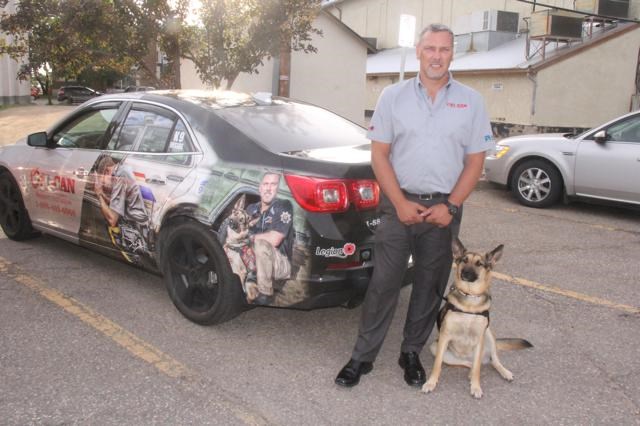By Greg Nikkel
Emergency workers in Weyburn and area don’t have to try to handle the tough emotions and thoughts after a traumatic fire or accident, as they now have the opportunity to meet with their peers and share in a safe and confidential way how these experiences affect them.
Weyburn is one five locations in the province for a support group under the OSI-CAN program, or the Operational Stress Injury support initiative, held each Monday evening at the Legion Hall at 7 p.m.
OSI-CAN was created in Saskatchewan in January of this year to help first responders and veterans who suffer either from operational stress injury or post-traumatic stress disorder (PTSD), and is open to police, fire fighters, EMS personnel, First Responders, military or ex-military.
The facilitator of the group is provincial coordinator Chris Siddons, a former member of the British Army who was himself diagnosed with PTSD in 2014 after twice attempting to take his own life, after serving tours of duty in Iraq during Desert Storm, and in Northern Ireland.
“It provides peer support so everybody’s supporting each other, and the goal is to provide a non-judgemental safe place to talk,” said Siddons, noting the group is also open to the veterans of the Royal Canadian Legion, one of the provincial partners of this support initiative, along with the Canadian Mental Health Association.
Siddons brings his trauma service dog, Sierra, with him, and credits Sierra with saving his life and with being a vital part of his everyday life now.
One of the goals of the group is to pair two service dogs with handlers in its first year, and by the second year to pair six service dogs with handlers, as one way to provide help and support to those diagnosed with PTSD.
Siddons has a working group that he is also a part of, which provides access to such resources as the Royal Canadian Legion’s Saskatchewan Command, the RCMP and municipal police services, a pharmacist and a psychologist. He points out he is not a counsellor or psychologist, but if a person needs one, he can make referrals for these professional services.
The meetings are informal and completely confidential, noted Siddons, so emergency personnel or members of the military can feel free and open to share anything they need to talk about.
The Weyburn organizer of the group, Marvin Fox, said there were no such groups when he formerly served as an paramedic in the 1980s, as personnel were given a debriefing, and otherwise were left on their own to deal with the fallout of dealing with traumatic emergency situations. In raising awareness of this organization, Siddons had Sierra with him along with his specially-detailed car at the Weyburn Car Show on Saturday, and plans to be in the Weyburn Fair parade on Monday, July 4.
There is a need for such groups, said Siddons, noting this is the first one of its kind in Saskatchewan. Bringing up statistics for Canada for the past year, there were 23 first responders and five members of the military who committed suicide.
One of the changes they are seeking to make in Saskatchewan is to have recognition of PTSD by the Workmen’s Compensation Board (WCB), which does not currently give recognition as a legitimate reason to be off from work.
“You have to file a claim, and that claim gets decided by the WCB, which can take two to six months,” said Siddons, noting that if they think there is a possibility that PTSD is a factor, they will send the person to be tested by a psychologist or psychiatrist, and if they are diagnosed then they can come back and get into a program that will help them.
The OSI-CAN group in Saskatchewan is circulating a petition currently, asking the provincial government to amend the Saskatchewan Workers Compensation Act to include a presumptive clause for work-related PTSD and other occupational stress injuries when diagnosed by a psychiatrist or psychologist.
They want to see this presumptive clause extended to members of police services, fire department, EMS, corrections employees, crisis intervention workers and social workers, due to the high levels of psychological stress experienced in these professions.




